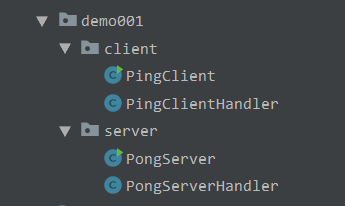Recently, after studying netty and reading the blog for a few days, I plan to write a hands-on program by myself.
This program is very simple: the client sends a ping, and the server will reply a pong accordingly. When the server loses the connection, it will be disconnected.
The whole code is divided into two parts: client and server. The structure is as follows:

Import netty package:
<dependency> <groupId>io.netty</groupId> <artifactId>netty-all</artifactId> <version>4.1.15.Final</version> </dependency>
client terminal:
PingClient.java
package org.attempt.netty4.demo001.client; import io.netty.bootstrap.Bootstrap; import io.netty.channel.Channel; import io.netty.channel.ChannelInitializer; import io.netty.channel.ChannelOption; import io.netty.channel.EventLoopGroup; import io.netty.channel.nio.NioEventLoopGroup; import io.netty.channel.socket.SocketChannel; import io.netty.channel.socket.nio.NioSocketChannel; import io.netty.handler.codec.string.StringDecoder; import io.netty.handler.codec.string.StringEncoder; public class PingClient { /** Server IP address */ private String host = "127.0.0.1"; /** Server port */ private int port = 8000; private EventLoopGroup group = null; private Bootstrap b = null; private Channel channel = null; public PingClient() throws Exception { EventLoopGroup group = new NioEventLoopGroup(); b = new Bootstrap(); b.group(group) .option(ChannelOption.SO_KEEPALIVE, true) .channel(NioSocketChannel.class) .handler(new ChannelInitializer<SocketChannel>() { @Override protected void initChannel(SocketChannel channel) throws Exception { channel.pipeline() //String decoding and encoding .addLast(new StringDecoder()) .addLast(new StringEncoder()) //Client logic .addLast(new PingClientHandler()); } }); } public Channel getChannel() throws Exception { if(null == channel || !channel.isActive()) { channel = b.connect(host, port).sync().channel(); } return channel; } public static void main(String[] args) throws Exception { PingClient client = null; try { client = new PingClient(); Channel channel = client.getChannel(); while(true) { //The status of the output channel, corresponding to close() System.out.println(channel.isOpen()); //Judge connection status if(channel.isActive()) { channel.writeAndFlush("ping"); } else { System.out.println("Lose connection, close client"); channel.close(); break; } Thread.sleep(5000); } } finally { if(null != client) { client.stop(); } } } public void stop() { if(null != group) { //Exit gracefully and release resources of thread pool group.shutdownGracefully(); } } }
PingClientHandler.java
package org.attempt.netty4.demo001.client; import io.netty.channel.ChannelHandlerContext; import io.netty.channel.SimpleChannelInboundHandler; public class PingClientHandler extends SimpleChannelInboundHandler { @Override protected void channelRead0(ChannelHandlerContext ctx, Object msg) throws Exception { System.out.println("receive from server: " + msg.toString()); } }
server terminal: PongServer.java
package org.attempt.netty4.demo001.server; import io.netty.bootstrap.ServerBootstrap; import io.netty.channel.ChannelFuture; import io.netty.channel.ChannelInitializer; import io.netty.channel.ChannelOption; import io.netty.channel.EventLoopGroup; import io.netty.channel.nio.NioEventLoopGroup; import io.netty.channel.socket.SocketChannel; import io.netty.channel.socket.nio.NioServerSocketChannel; import io.netty.handler.codec.string.StringDecoder; import io.netty.handler.codec.string.StringEncoder; public class PongServer { public static void main(String[] args) throws Exception { int port = 8000; if (args != null && args.length > 0) { try { port = Integer.valueOf(args[0]); } catch (NumberFormatException e) { //Use default } } new PongServer().bind(port); } public void bind(int port) throws Exception { //Configure NIO thread group of server EventLoopGroup bossGroup = new NioEventLoopGroup(); EventLoopGroup workerGroup = new NioEventLoopGroup(); try { ServerBootstrap b = new ServerBootstrap(); b.group(bossGroup, workerGroup) .channel(NioServerSocketChannel.class) .option(ChannelOption.SO_BACKLOG, 1024) .childHandler(new ChannelInitializer<SocketChannel>() { @Override protected void initChannel(SocketChannel channel) throws Exception { channel.pipeline() //String decoding and encoding .addLast(new StringDecoder()) .addLast(new StringEncoder()) //The logic of the server .addLast(new PongServerHandler()); } }); //Binding port, synchronization waiting for success ChannelFuture f = b.bind(port).sync(); //Wait for the server listening port to close f.channel().closeFuture().sync(); } finally { //Exit gracefully and release resources of thread pool bossGroup.shutdownGracefully(); workerGroup.shutdownGracefully(); } } }
PongServerHandler.java
package org.attempt.netty4.demo001.server; import io.netty.channel.ChannelHandlerContext; import io.netty.channel.SimpleChannelInboundHandler; /** * @author admin * @date 2018-09-06 22:48 */ public class PongServerHandler extends SimpleChannelInboundHandler { @Override protected void channelRead0(ChannelHandlerContext ctx, Object msg) throws Exception { System.out.println("receive from client: " + msg.toString()); //Return client message if(msg.toString().equals("ping")) { ctx.writeAndFlush("pong"); } else { ctx.writeAndFlush("UNKONWN"); } } }
To run, start the server and then the client. The result is as follows:
- server terminal:
receive from client: ping receive from client: ping receive from client: ping receive from client: ping receive from client: ping Process finished with exit code -1
- client terminal:
true receive from server: pong true receive from server: pong true receive from server: pong true receive from server: pong true receive from server: pong false //Lose connection, close client
Some classes and usage in the code will be discussed later.